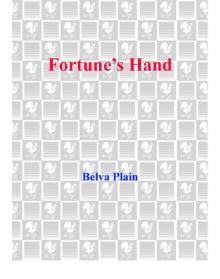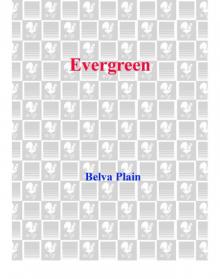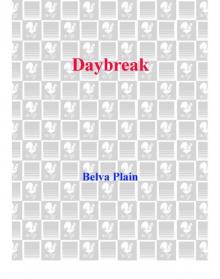- Home
- Belva Plain
Treasures Page 10
Treasures Read online
Page 10
“Don’t worry, it’ll all come back to you. Besides, don’t forget, I’m an instructor.”
He felt so eager, so excited, that he sang in the shower that night. A man didn’t often have two triumphs in one day.
So began a memorable week. Because he had assured himself that his first attempt to ride a horse would be successful, so it was. At least, it was no failure. Smart in the new habit and armed beforehand with an hour’s worth of study from a paperback book of instructions, Eddy managed to give a fair performance.
“Am I too awful?” he asked Pam as, carefully, they walked their horses past low-hanging branches.
“For somebody who hasn’t ridden in years, you’re doing well,” she assured him. “All you need is practice.”
Actually, he was enjoying himself. Tomorrow he would certainly have a sore rear, but that was unimportant. One could get hooked on this sport, he felt. It was a whole lot better than golf, which had always seemed too slow for him.
The city, in the days that followed, might as well have been on another planet for all the differences between its noisy, melting streets and the bliss of fresh winds and airy lawns. Pam and Eddy went exploring. They sailed, swam, sat on a dock eating lobster sandwiches, played tennis, and laughed a good deal. To Pam’s surprise Eddy wanted to take a tour of historic houses; she was even more surprised at how much he knew about furniture periods and architectural styles.
“I like to have beautiful things around me,” he said simply, “so I need to learn about them.”
She took him then to an antique shop, where they both browsed and he bought a pair of Staffordshire figures, authentic and charming, but modestly priced. In the same shop he saw a pair of Dresden figurines, which were naturally expensive; those he would have liked to buy, but did not do so for fear of seeming ostentatious before Pam, whom after all he scarcely knew. One evening they went to an Italian movie, on another to an outdoor concert, and on one had a backyard supper at Pam’s house, then sat on the porch with her mother, who went upstairs after a proper interval.
On the sixth night, under a bright moon, they came back to the porch. The house was already dark, and there was no sound as they came up the steps but for the thumping of the old dog’s tail.
“I haven’t seen him before,” said Eddy. “Where are the poodles?”
“They sleep in my mother’s room. This is Buster. He’s mine. I rescued him from the pound. His owners left him there after twelve years. Can you believe it? It could have broken your heart to see the look in his eyes. He couldn’t understand why they were walking away without him. So I took him, and I think he’s getting over his loss. Poor guy.”
I really like her. I really do, he said to himself. And curiously, he asked, “Tell me. Do you ever look far ahead? Plan what you want to do with your life, I mean?”
“Oh, I’d like to live pretty much as I’m living now. And someday have a husband and children, but not for a long time.”
That seemed strange, since she wasn’t one of the competitive career women who filled the banks and the law offices these days. Most other women had “marriage” written on their faces after the first half-dozen meetings.
He pressed her. “You don’t feel that you’re missing anything?”
“No. I like being independent. What should I miss?”
He hesitated and then took a chance. “Well, sex, for instance.”
She laughed. “I don’t deprive myself. Not when I meet the right person.”
He pressed again. “How do you recognize when you’ve met him?”
And she, laughing again, replied, “Now, you know better than to ask a silly question like that!”
Their chairs were so close that their knees almost touched. The sweetest, most alluring fragrance lay on the air: her perfume or that flowering vine that climbed the railing? He stood up and took both her hands. Her body, yielding easily, rose up to meet his.
“Where shall we go?” he whispered.
“Here, in the swing. Don’t worry, it doesn’t creak.”
His head swam with an explosion of fire that came from the very depth of him, from the racing of his blood. Clothes dropped in an instant to the floor; an instant later he lay with her in the swing. He had heard about sex on a water bed, about its soft, erotic sway; he had heard, too, about sex outdoors on a summer night, and had never tried either until now. Those were his quick thoughts, and then there was no thought, only that fire exploding, and afterward, the sweetness. The sweetness.
“And I thought—I thought you would be cool,” he said.
“Cold? Frigid?”
“No, not that. Far from that. But—it’s hard to explain. I just didn’t think you would be like this.”
She had been lying with her head on his shoulder and now sat up.
“Like what? What am I like?”
He sat up, too, shaking himself. Never, never had he had such sex. “You won’t believe me. You’ll think it’s just a line that a man hands out. But the truth is that I’ve never felt anything quite like this. I don’t know what you did, but—”
“And if I tell you that I don’t make a habit of sex with a practical stranger, will you believe me? You’re probably thinking, Oh, they all say that, and you’re right, I suppose, but in this case it happens to be the truth. I need to have real feeling, real and quick and deep. And that happens very, very rarely.” Pam took his hand. “So. Do you believe me or not?”
He looked into her eyes, which shone now in a sudden shaft of light from the sky.
“I do believe you,” he answered.
After that he knew he could not forget her. All the way back to New York when the vacation week was over, he thought about her. He would have liked to give her a present, not flowers, chocolates, or books, but something beautiful, like a pendant or a bracelet. Just as a remembrance of seven wonderful days. But he remembered that she had once spoken with scorn of some girls who accepted expensive presents from men. She had standards, Pam had. Having learned that much about her, he decided on flowers, the most lavish roses that could be ordered.
One other thing he knew about her: She was not a fortune hunter, like so many of the women to whom he had been introduced of late. He had learned to recognize and to expect their lingering, hungry look whenever they passed a jewelry store.
Still another thing: She had said quite plainly that she was not ready for marriage, which was perfect because he was not either. Not yet.
But when I am ready, he thought, it will be Pam, or if she won’t have me, which is possible, then somebody just like her.
About six months later Richard Tory was able to say, “He’s a financial whiz, your brother is. Do you know, with those futures he bought, I added ten percent to my capital? It’s incredible. I think,” he proposed cautiously, “I think we’re in a position now to look for that apartment you’ve been wanting.”
Warmth like a glow from liquor surged through Connie’s chest, and she took a last look at the common little box, adorned with cheap chrome and steel, the little box that had once been a delight.
“How large can we go?”
“Well, four rooms, perhaps?”
She thought of Bitsy’s ten new rooms. “How about five, so we can spread out some? You said you wanted to bring all your books from Houston.”
“Well, all right. It’ll come high, especially where Eddy’s looking, and I guess that’s where you want to be too. Not that we can plan anything on his scale.” Richard got out a pad and pencil, and she waited, looking over his shoulder, with an anxious tilt to her head. “Let’s see. I can go as high with my salary as five or six hundred. I can handle the mortgage. And I’ll pay it off as fast as Eddy can make my money grow. After all, property’s always the best investment. You can’t lose on a New York co-op.”
“What about furniture? The only things we own are the screen and the mirror.”
“We’ll shop carefully on Third Avenue where we found those. We’ll go gradually, step by step, tak
e our time.”
Not too much time, Connie thought. Richard was so slow, deliberate and slow. Not like Eddy, who went right after what he wanted and got things done.
CHAPTER FIVE
Eddy and Connie had flown out to see Davey’s brand-new plant. It was a day for celebration. “Before we go see the plant,” Lara said, “we’ll have a big lunch—I’ve got a turkey in the oven. Then we can go later.”
“But not too late. Eddy and I are taking a six o’clock plane home.”
“I thought you were staying over Sunday,” Lara said, sounding plaintive. “Such a flying visit—”
“I know. But Eddy changed his mind. You know he’s a workaholic, and as for me, I do have a husband. By the way, Richard said to tell you he’s terribly sorry he couldn’t make it. He’s bogged down with evening meetings, but we will definitely both come during Christmas. A promise.”
Connie looks extraordinarily pretty today, Lara thought. Her hair was lighter, almost ash-blond, and she was wearing a mink jacket. One didn’t have to be experienced in the wearing of mink to know that this was no ordinary department-store bargain, nor were the claret-colored shoes and the matching woolen dress.
“You look lovely,” she said. “And happy too.”
“Do I?” Connie replied lightly. “It’s probably the new apartment.”
“Is that all?”
“All? That’s plenty.”
“Tell me about it.”
“Well, it’s between Madison and Park. You wouldn’t know where that is, but it’s a prime neighborhood. The whole thing isn’t exactly what I wanted, because two of the rooms at the rear are rather dark. Still, it’s a dream compared with the old dump. All we have to do now is furnish it.” Connie sighed. “We’ve got the bedroom finished and a lot of other stuff on order. English country things, mostly, mahogany and oak, lots of chintz and linen. I sort of fell in love with all that when we were in England.”
There was a casual air of authority in her tone, a subtle change of which she was probably not even aware, from the last time Lara had seen her in the place she now described as a dump. It had always seemed strange to Lara that money changed people so abruptly. Although, she reflected, if Davey’s new enterprise works out, it won’t make any change in him. That she knew. And yet she felt no disapproval of Connie, but only a vague doubt.
Then she said shyly, “I’m rather happy today. Happy and hopeful. I missed this month. I might be pregnant, I think.”
Connie got up and hugged her. “Oh, darling, I hope so! A person really ought to get something she wants so much!”
“And you? Or shouldn’t I ask?”
“All in good time. I’m in no rush.”
“It looks as if Eddy’s in no rush either. I wish he’d get married, at least.”
“Why? He couldn’t be happier than he is now, although I do think he has a girl he sees a lot.”
“Really? Who is she?”
“All I know is that her name is Pam. She likes horses.” Connie laughed. “So he’s taken up riding in a big way. I think she’s in the Social Register or something.”
“Well, Eddy always had big ideas.” Lara was amused.
When the men came in they all had lunch, and right afterward got into Davey’s new Jeep to drive to the far side of town where the plant was situated. It was a neat, low building that had been a small warehouse, behind a wire fence. The spacious parking lot was empty.
“Room for five hundred cars, I’d estimate,” said Eddy, “wouldn’t you say so, Davey?”
Davey grinned. “More than I’ll ever need, that’s for sure.”
Eddy corrected him. “More than you’ll need for a while, you mean.”
Above the white-painted entrance was a dignified sign, saying only THE DAVIS COMPANY. The open warehouse space had been divided into various work areas, where sundry pieces of machinery, some still disconnected and others still uncrated, had been placed.
Lara made a proud comment. “A little different from the workbench in the shed out back.”
Offices had been partitioned off at the far end of the building. Davey pointed them out.
“This one’s mine, and that’s Lara’s. She takes a load of paperwork off my shoulders, let me tell you.”
“You’ve got a first-class accountant, I hope,” Eddy continued. “You’ve got to watch those taxes, watch those dollars.”
Davey nodded. Lara, standing between them, could not help but feel, regardless of her own independent strength and confidence, a certain sense of being protected by the two men. I suppose that’s from generations of brainwashing, she told herself with some amusement.
“I watch them,” Davey said.
“You’ve got to make them grow faster and bigger.”
“What do you mean?”
“Listen to me, Davey. You can’t afford to lag behind. You’ve got a good thing here, a growing child, and it needs to be fed. You’ve got to nourish its growth.”
“What do you mean?” Davey repeated.
“What I mean is, it’s time to go public, to issue stock. You need capital so you can expand. Listen to me, Davey. I know what I’m talking about.”
“I’m comfortable with the size we are. Lara and I—well, she really manages the office, the wages, and the orders, while I get my hands black in the machine shop. And three salesman are out traveling. I have been thinking of adding salesmen, it’s true, but—”
“If you were to get as few as twelve stockholders, each with fifty thousand dollars, for example, you’d have over half a million for improvements.”
“I don’t want to get involved with strangers and give them a vote in the running of my affairs. I’m a small-town guy, Eddy, I admit it.”
“Listen to me. You wouldn’t have to sell stock to strangers. There must be a dozen well-heeled people in this town, maybe even friends of yours, who would jump at a chance to invest in a growing company.” Eddy looked around and up at the ceiling. “This place is nice, yes, but it can use a lot of fixing up. And you’d have cash to buy machinery. I’m sure you’ll be needing some.”
“Well, yes,” Davey acknowledged. “I was hoping to get a loan for it.”
“Then you’d be saddled with interest payments. Will you please do it my way, Davey? I can set up the whole thing for you. Finance is my business, isn’t it, for God’s sake? All you need is to keep on with what you’re doing and leave the rest to me. Have I ever steered you wrong?”
“No. No, you haven’t.”
“All right, then. Go home and start thinking about whom you can approach to buy shares.”
Davey and Lara looked hesitantly at one another. After a moment Lara spoke.
“Dr. Donnelly? He’s been Davey’s family doctor since Davey was a baby,” she explained to Eddy. “And Tony? What do you think, Davey? His aunt Alma left him a pile of money.” Again she explained, “He’s been Davey’s best friend from kindergarten through college.”
“That’s great! Those are the kinds of contacts you need.”
Davey spoke. “I could ask Ben at Levy’s Dry Goods. He’d probably be interested.”
Eddy’s enthusiasm mounted. “There. You see? That’s three already, so keep it up.” He glanced at the clock. “I’m in a rush. Got to get back. Listen. I’ll get working on this, talk to my lawyers, and get back to you by the end of the week. I see a big future here, Davey. Bigger than you probably realize. But you’ve got to put it on the road, and not in a horse and buggy either. You understand?”
“I guess I do,” Davey said. “You are convincing, I must say.”
“Okay! We’ll be talking.”
They took a roundabout route to the airport. Connie said she felt as though she had been away forever and if there was time she would like a tour of the old places. Davey told her that there was nothing really new in town except a strip mall and a housing development on the south end that they could pass.
When they came to it, a scattering of unoriginal, yet pleasing, shingled colonials
on a huge, sloping field that had been denuded of trees, Eddy insisted on seeing the model house. So they all trooped through empty rooms that had the fresh smell of new wood, through picture-book bathrooms and a magnificent kitchen with a barbecue and a view of the autumn sky at the top of the slope.
“This,” Eddy declared, “is what you two should buy.”
“This isn’t the time,” Davey said. “We need to put money back into the business.”
“This is exactly the time, Davey. I always tell you people should enjoy life as they go along. Today won’t come again. It’s now that you’re young.” Eddy pointed toward the window. “Look at the space out there. Fence it in, make a hedge of evergreens. You’d have room for a garden, maybe even a pool eventually. What have you got now? A dingy yard and a shabby screened-in porch.”
“He’s right,” asserted Connie. “After all, he’s not talking about a mansion, just a pretty simple house.”
Lara considered the lemon-yellow appliances, the European cabinets, the butcher-block island, and the brass chandelier. In her estimation these were hardly simple, and she said so.
With slight impatience in her voice Connie rebuked her. “You never want anything!”
Just so had Connie used to speak, with that frown, when she was in grade school. And Lara, countering that impatience with the patience she had used back then, replied, “It’s no use wanting what you can’t afford.”
Eddy clapped Davey on the back. “Go for it! You can afford it. I’ll be your mortgagor. I’m flooded with cash right now.”
“Thanks, Eddy, but the answer is no. I owe you enough already,” Davey said.
“Okay, brother-in-law. You’re a stubborn customer and always were. But I don’t have to tell you that I never give up either.” He looked at his watch. “We don’t have a lot of time. Let’s go, folks.”
At the local airport the Davises watched Eddy and Connie climb the steps to board the plane. At the top of the steps they both turned and waved, Connie’s newly bright hair streaming out in the wind. And Lara, along with a sense of loss at this departure, had a curious sense of relaxation. They were both so—so energetic. The two of them were alike, people in a hurry, bright and lovable and quick to fill every hour, with no rest. It made you tired just to think of living like that.

 The Golden Cup
The Golden Cup Her Father's House
Her Father's House Whispers
Whispers Crescent City
Crescent City Legacy of Silence
Legacy of Silence Crossroads
Crossroads Promises
Promises After the Fire
After the Fire Tapestry
Tapestry Looking Back
Looking Back Heartwood
Heartwood The Carousel
The Carousel Fortune's Hand
Fortune's Hand Homecoming
Homecoming Random Winds
Random Winds Harvest
Harvest Evergreen
Evergreen Treasures
Treasures The Sight of the Stars
The Sight of the Stars Secrecy
Secrecy Daybreak
Daybreak Eden Burning
Eden Burning